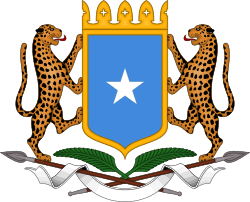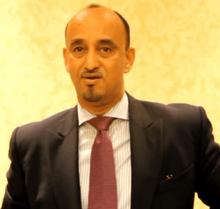Ministry of Defence (Somalia)
The Ministry of Defence (Somali: Wasaaradda Gaashaandhigga) is charged with co-ordinating and supervising all agencies and functions of the government relating directly to national security and the Somali Armed Forces. The President of Somalia is the Supreme Commander of the Armed Forces of the country. The Ministry of Defence provides policy framework and resources to the Armed Forces to discharge their responsibility in the context of the defence of the country. The Armed Forces (including Somali Ground Forces, Somali Air Force, and Somali Navy) under the Defence Ministry are primarily responsible for ensuring the territorial integrity of the nation. The current Minister of Defence of Somalia is Hassan Mohomed Amardanbe.[1]
| وزارة الدفاع Wasaaradda Gaashaandhiga | |
 | |
| Agency overview | |
|---|---|
| Formed | 12 April 1960 |
| Jurisdiction | Federal Government of Somalia |
| Headquarters | Mogadishu, |
| Agency executive |
|
| Parent agency | Cabinet of Somalia |
| Website | www |
History
Historically, Somali society conferred distinction upon warriors (waranle) and rewarded military acumen. All Somali males were regarded as potential soldiers, except for the occasional religious cleric (wadaado).[2] Somalia's many Sultanates each maintained regular troops. In the early Middle Ages, the conquest of Shewa by the Ifat Sultanate ignited a rivalry for supremacy with the Solomonic dynasty.
In 1914, the Somaliland Camel Corps was formed in British Somaliland and saw service before, during, and after the Italian invasion of the territory during World War II.[2]
After independence, the Darawishta merged with the former British Somaliland Scouts and new recruits to form a 5,000 strong Somali National Army.[3] The new military's first commander was Colonel Daud Abdulle Hirsi, a former officer in the British military administration's police force, the Somalia Gendarmerie.[2] Officers were trained in the United Kingdom, Egypt and Italy. Despite the social and economic benefits that military service brought, the Somali Armed Forces began to suffer chronic manpower shortages only a few years after independence.[4] After the 1969 Somali coup d'état, most Ministers of Defence were drawn from the Supreme Revolutionary Council until 1990-91. The subsequent outbreak of the Somali Civil War from the late 1980s led to the armed forces disintegrating totally.
Somalia's armed forces were gradually reconstituted after the establishment of the Transitional Federal Government (TFG) in 2004. After the creation of the Transitional Federal Government in 2010, several ministers succeeded each other. Abdihakim Mohamed Fiqi, a former Somali diplomatic with service in Washington, became Minister of Defence in mid-November 2010. While he had known that Al-Shabaab occupied the Ministry of Defence building at the time, he had not realised the weaknesses of the interim MOD premises in the privately owned Jidda Hussein building.[5] There, the ministry had only two rooms, without internet or electricity. Thus the handshake transfer of responsibility - there was nothing more to hand over - took place in the palace, in the living room of the Somali Armed Forces commander.
Organization
- Minister of Defence
- Deputy Minister
- Secretary-General
- Under the Authority of Secretary-General
- Internal Audit and Investigation Division
- Somali Armed Forces Council Secretariat
- Key Performance Indicator Unit
- Legal Division
- Strategic Communications Unit
- Integrity Unit
- Deputy Secretary-General (Development)
- Development Division
- Procurement Division
- Somali Armed Forces Cataloguing Authority
- Deputy Secretary-General (Policy)
- Policy and Strategic Planning Division
- Defence Industry Division
- Defence Reserve Depot
- Deputy Secretary-General (Management)
- Human Resource Management Division
- Information Management Division
- Finance Division
- Account Division
- Administration Division
- Chief of Defence Forces
- Chief of Army
- Chief of Navy
- Chief of Air Force
- Joint Force Commander
- Director of General Defence Intelligence
- Chief of Staff Somali Armed Forces Headquarters
- Under the Authority of Secretary-General
- Secretary-General
- Deputy Minister
Defence Ministers
Major General Muhammad Ainanshe, a member of the SRC, lost his portfolio of Minister of Defence on 10 April 1971 before his arrest on 4 May 1971.[6]
| Portrait | Name (Birth–Death) |
Term of office | Political party | |||
|---|---|---|---|---|---|---|
| Took office | Left office | Time in office | ||||
| Lieutenant General Mohammad Ali Samatar (1931–2016) | 1976 | October 1981 | 5–6 years | SRSP | ||
| Brigadier General Omar Haji Mohamed[8] (?–?) | October 1981 | ? | ? | |||
| General Aden Abdullahi Nur (?–2002) | 1986(?) | 1988 | 1–2 years | SRSP | ||
| Hussein Sheikh Abdirahman (1941–2016) First civilian Defence Minister under Barre[9] | 1989 | 1990 | 0–1 years | SRSP | ||
| Hussein Sheikh Abdirahman (?–2016) [10] | 2008 | 2008 | 0 years | Independent | ||
| Mohamed Abdi Mohamed (born 1954) | 21 February 2009 | 10 November 2010 | 1 year, 262 days | Independent | ||
| Abdihakim Mohamoud Haji-Faqi | 12 November 2010 | 20 July 2011 | 250 days | Independent | ||
| Hussein Arab Isse | 20 July 2011 | 4 November 2012 | 1 year, 107 days | Independent | ||
| Abdihakim Mohamoud Haji-Faqi | 4 November 2012 | 17 January 2014 | 1 year, 74 days | Independent | ||
| Mohamed Sheikh Hassan | 17 January 2014 | 27 January 2015 | 1 year, 10 days | Independent | ||
| Abdulkadir Sheikh Dini | 27 January 2015 | 21 March 2017 | 2 years, 53 days | Independent | ||
| Abdirashid Abdullahi Mohamed | 21 March 2017 | Incumbent | 3 years, 96 days | Independent | ||
References
- "PM Khaire announces 27 member cabinet". Hiiraan Online. March 21, 2017.
- Library of Congress Country Study, Somalia, The Warrior Tradition and Development of a Modern Army, research complete May 1992.
- Robinson, Colin D. (2019). "Glimpse into an Army at its Peak: Notes on the Somali National Army in the 1960-80s". Defence and Security Analysis. 35 (4): 423–429. doi:10.1080/14751798.2019.1675944.
- Library of Congress Country Study, Somalia, Manpower, Training, and Conditions of Service (Thomas Ofcansky), research complete May 1992.
- Harun Maruf; Dan Joseph (2018). Inside Al-Shabaab: The Secret History of Al-Qaeda's Most Powerful Ally. Indiana University Press. p. 167.
- Daniel Compagnon, "RESSOURCES POLITIQUES, REGULATION AUTORITAIRE ET DOMINATION PERSONNELLE EN SOMALIE: LE REGIME SIYYAD BARRE (1969-1991), PhD thesis, Volume 1, 289-290.
- Nelson et al., Country Study, 1982, 247-48, 267.
- Nelson et al., Country Study, 1982, 247-48, 267.
- "Former Somali defense minister dies in US". Hiiraan Online. 2016-05-17. Retrieved 2016-06-10.
- "Islamists kill Somalia's former defence minister with car bomb". Reuters. 2016-02-15. Retrieved 2016-03-13.



.jpg)